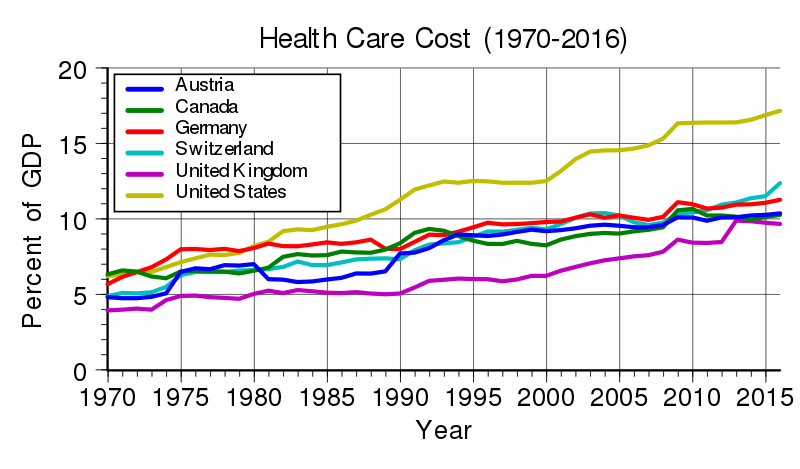Rugoz wrote:Is it? All kinds of social problems correlate strongly with relative poverty and inequality.
These studies are all done in the context of a Western, social-democratic mind-set which sees government as a parental god-like entity capable, and duty-bound to fix society's ills.
Take a longer look back in history (human nature hasn't changed in the past 100 years, has it?) and you'll find many stable societal configurations with vast inequalities. Note - I am not advocating a return to feudal power-relations. But feudal societies have been stable for centuries, so any assertion that human nature is inconsistent with stable societies exhibiting sharp inequalities is very questionable.
Rugoz wrote:Besides that, don't forget that equal opportunity is only achievable if children have similar care and education from early childhood. IMO this is the main reason why government services targeting families and children are absolutely necessary. The rest is debatable.
No, equal opportunity is unachievable. Period. No amount of social spending by government will change the fact that children and their parents differ individually, have different attitudes towards education and work, and live in different micro-cultures.
The fact that equal opportunity is unachievable puts a question mark around labelling services purporting to achieve this impossible goal as "absolutely necessary".
There is a separate discussion, of course, around whether it is moral to force some members of society against their will to help equalize opportunities for the children of other members of society.
grassroots1 wrote:The poverty line is the minimum income thought to be required for an average quality of life in a given country.
I stand (partially) corrected. Different countries employ different methods for calculating the poverty line. In many cases, that line is defined as a fraction of the average or median income. I now see that in the US, it is defined in absolute terms. There is a big question around what should constitute an "average" or "minimum acceptable" quality of life, as well as (in my mind) much more serious question about the many ways that government regulations cause the cost of living to be higher in developed countries, but those are outside the scope of this discussion.
grassroots1 wrote:They've benefited by virtue of their position while others suffer by virtue of theirs. It's the sensible option, if we're trying to reach our full potential as a nation, to ensure that each person has the opportunity for self-actualization.
I understand your position, and I think that as a matter of
ethics it is a reasonable one to hold. As a matter of
justice, the decision over how much to help poorer members of society should be left with the property owner, rather than with a (distorted) majority vote. It is particularly obscene when poor people cast their vote, swinging the decision over how much of other people's property should be confiscated and handed to them.
I also note a wide discrepancy between the theory and the practice of helping the poor - programs designed and intended to help the poor rarely do so. They rather tend to trap people into lifelong poverty. That feature of government programs makes giving people an ability to control how their money is spent (wasted) much more important. As case in point, I am happy to donate money to charity, and I routinely help people in the third world. I resent seeing my tax money being handed to free-riders who choose living off the state as a lifestyle choice.
grassroots1 wrote:What is the truly unbelievable transgression here is that rich people (and, for some reason, others who place the rich on a pedestal) have made the pretentious assumption that they are the only productive members of society, and that they are in their position not because of circumstance but because of their own superiority.
There is something to this, but not quite.
First, let's draw a clear distinction between "rich" meaning a person with plenty of assets, and "rich" as a person with a high income. Clearly, a person can be rich in the former sense without working a day in their lives. However, their wealth must have come from someone else (say their parents) who did earn it.
Focusing on current income then, in a free society (i.e. excluding crony capitalism and its many facets), people acquire wealth by producing it, rather than by, in any way, taking it from others. Obviously poor people also produce wealth, albeit at a lower rate than rich people. The rate at which you create wealth is generally correlated with how hard you work (i.e. other things being equal, the harder you work the more you generate), but depends on many other factors which vary from person to person.
From an ethical point of view, people, being self-owners, also own all the wealth that they personally produce (or that others gift them). There is no correlation between the amount of effort one puts in (or how hard one works) and how productive one is. A fairly lazy westerner is vastly more productive than a very hard-working peasant in a third world country. The westerner doesn't "deserve" his wealth in the sense of being justly "awarded" the wealth as a reward for his efforts. That's not how free societies work. Rather, the westerner justly owns his wealth because he justly owns himself.
It is true that (in western societies), every healthy person can create for himself a very tolerable lifestyle using his own effort. No healthy working person in the west ever starves. In fact, no healthy person in the west should be unable to afford adequate shelter, food, clothing and at least modest luxuries (TV, cell phone, etc.). Every healthy person should be able to afford all of those without getting a hand-out from the state.
This has led them to the opinion that they should pay no taxes on income they have acquired "due to their own ability," and it has led them to the absurd conclusion that the poor are being carried along by their own productivity when the reality is the opposite.
Not quite.
The reason nobody (rich or poor) should pay any taxes is because they justly own the wealth they produce, and should have absolute discretion over how to use it. Anything short of that is akin to slavery - the notion that you don't really belong to yourself, but rather than others have a claim to you, your body and the fruits of your labour.
Please note that the source of our rightly owning our justly-acquired income is not that we somehow "deserve" it, but rather that, as self-owners, it belongs to us.
As for the "reality", did you notice what fraction of taxes are being paid by the top income brackets in society? For all intents and purposes, wealthy people pay for everything the state does, from foreign wars to education, health-care and social safety-net.
The worst thing is that they imagine that we couldn't go without them when in fact we'd be much better off without them.
This is both short-sighted (to the point of being blind) and incredibly ungrateful attitude, given, as mentioned above, that the wealthy effectively fund your precious state.
Again, setting aside the cronies of the state (to which I oppose as strongly as any person), wealthy people do not acquire their wealth at others' expense. Rather, they
produce their wealth from nothing. Wealth is not constant - the world today is immeasurably wealthier than it was, say, 100 years ago. The difference has been produced, and has been produced predominantly by the people who currently own it (again, ignoring the wealth expropriated by the political class and handed to themselves and their cronies).
We used to live in a world with charity, and with poor people being properly grateful for the charity they were given. Now, poor people feel that they somehow
deserve charity (i.e. getting other people's property as a gift). They DON'T.
People often point out the fact that someone else is gaining an incredible amount of wealth from the system
What do you mean by "gaining ... wealth from the system"? Normal working people (whether wealthy or not)
produce their wealth. They are not sucking it from some "system".
Perhaps the difference between us is that I don't think people born into the world with a set of entitlement beyond being left alone. You seem to feel that being born entitles you to other people's assistance, even against their will. In other words, every person in our society is a potential parasite living off the productive members of society.
Some people certainly deserve our pity and our assistance. But they deserve it not as a matter of right, but as a matter of other people's good will.
Aside from that, people point to the concentration of wealth in this society as a point of concern for the concentration of POWER.
The mechanism that converts wealth to power is government.
Sometimes people too vehemently attack the wealthy, and some people are envious of wealth, but generally the desire to tax the rich falls in the realm of a sense of injustice and/or from a rational assessment of our situation.
Misplaced sense of justice, stemming from a zero-sum understanding of the economy? Perhaps.
Cost has increased because the number of people accessing care has increased and the average length of life has increased.
No. Cost has increased because of government regulation of health-care provision, government subsidies (making people price-insensitive) and government-granted monopoly through the patent system.
At the end of the day, health care is no different from any other service. Most services (with the notable exception of other services provided by government such as education) have become more efficient through use of technology, outsourcing, automation, and increased efficiency. Not so education, health-care and security, precisely the areas in which governments meddle most.
A public educational system is an investment in the quality of the nation.
At best, it is an investment in the quality of individuals, who reap the vast majority of the benefits of their own education. More typically, it is a major waste of both time and money.
What's so difficult to understand about the fact that it COSTS more to survive in a wealthier society than it does to survive in a poorer one. You cannot live on $2 a day in my city.
You could, if it wasn't for government regulations.
But let's set aside the question of envy and jealousy. I think we can both agree that there is some of that going around. I can also see your point that many poor people genuinely (whether mistakenly or not) believe that, as a matter of justice, they deserve money confiscated from wealthier people. The bottom line is that either way, poor people tend to want money that belongs to the rich.
Free men are not equal and equal men are not free.
Government is not the solution. Government is the problem.


















 I'm sorry, this is a non sequitur. You're idealizing the situation as if this specific form of government and the specific patterns we've seen emerge in America signify something universal about government when that's not the case, and you're also falsely labeling increasing levels of spending, which occurs for a variety of reasons, as "envy."
I'm sorry, this is a non sequitur. You're idealizing the situation as if this specific form of government and the specific patterns we've seen emerge in America signify something universal about government when that's not the case, and you're also falsely labeling increasing levels of spending, which occurs for a variety of reasons, as "envy."



 - By late
- By late - By Verv
- By Verv